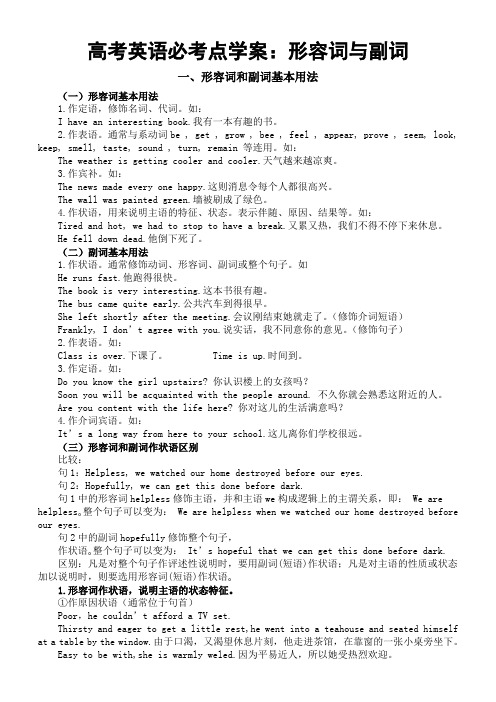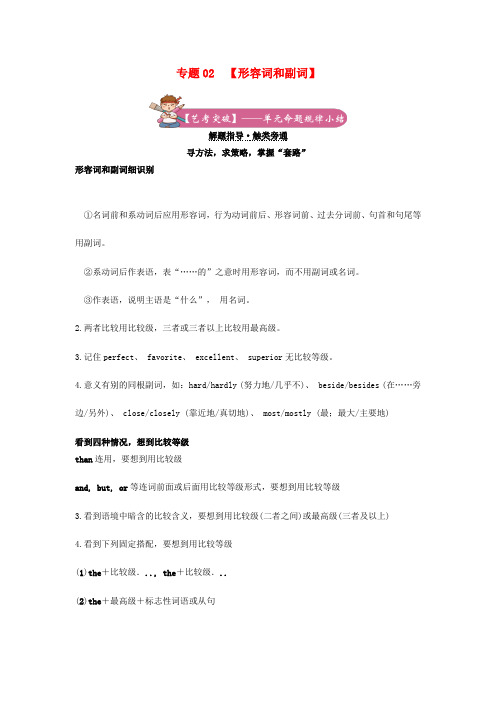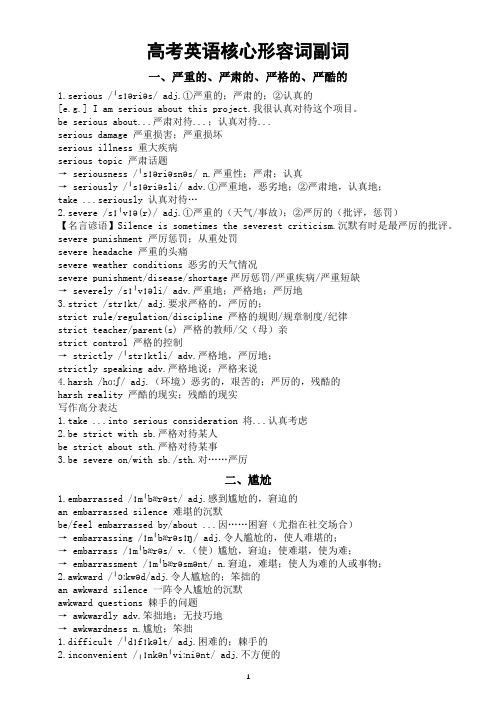高考英语专题复习 形容词和副词
高考英语复习形容词和副词知识点讲解讲义(必考点)

高考英语必考点学案:形容词与副词一、形容词和副词基本用法(一)形容词基本用法1.作定语,修饰名词、代词。
如:I have an interesting book.我有一本有趣的书。
2.作表语。
通常与系动词be , get , grow , bee , feel , appear, prove , seem, look, keep, smell, taste, sound , turn, remain 等连用。
如:The weather is getting cooler and cooler.天气越来越凉爽。
3.作宾补。
如:The news made every one happy.这则消息令每个人都很高兴。
The wall was painted green.墙被刷成了绿色。
4.作状语,用来说明主语的特征、状态。
表示伴随、原因、结果等。
如:Tired and hot, we had to stop to have a break.又累又热,我们不得不停下来休息。
He fell down dead.他倒下死了。
(二)副词基本用法1.作状语。
通常修饰动词、形容词、副词或整个句子。
如He runs fast.他跑得很快。
The book is very interesting.这本书很有趣。
The bus came quite early.公共汽车到得很早。
She left shortly after the meeting.会议刚结束她就走了。
(修饰介词短语)Frankly, I don’t agree with you.说实话,我不同意你的意见。
(修饰句子)2.作表语。
如:Class is over.下课了。
Time is up.时间到。
3.作定语。
如:Do you know the girl upstairs? 你认识楼上的女孩吗?Soon you will be acquainted with the people around. 不久你就会熟悉这附近的人。
高考英语二轮复习备考专项冲刺专题02形容词和副词(含解析)

专题02 【形容词和副词】解题指导·触类旁通寻方法,求策略,掌握“套路”形容词和副词细识别①名词前和系动词后应用形容词,行为动词前后、形容词前、过去分词前、句首和句尾等用副词。
②系动词后作表语,表“……的”之意时用形容词,而不用副词或名词。
③作表语,说明主语是“什么”,用名词。
2.两者比较用比较级,三者或三者以上比较用最高级。
3.记住perfect、 favorite、 excellent、 superior无比较等级。
4.意义有别的同根副词,如:hard/hardly (努力地/几乎不)、 beside/besides (在……旁边/另外)、 close/closely (靠近地/真切地)、 most/mostly (最;最大/主要地)看到四种情况,想到比较等级than连用,要想到用比较级and, but, or等连词前面或后面用比较等级形式,要想到用比较等级3.看到语境中暗含的比较含义,要想到用比较级(二者之间)或最高级(三者及以上)4.看到下列固定搭配,要想到用比较等级(1)the+比较级..., the+比较级...(2)the+最高级+标志性词语或从句考点突破·针对提能明考点,攻重难,有效提升考点一形容词和副词的基本用法1.形容词的基本用法形容词在句中可作定语、表语、宾语补足语、主语补足语、状语等。
(2019·江苏卷)Unlike traditional gyms, appbacked gyms offer people flexible options to exercise.不像传统的体育锻炼,有app软件的体育锻炼给人们提供了灵活的锻炼选项。
【名师点津】(1)形容词作状语主要表示原因、结果或伴随等,其逻辑主语必须与句子主语保持一致。
Lighthearted and optimistic, she is the sort of woman to spread sunshine to people through her smile. 她无忧无虑、积极乐观,是那种用微笑给别人带来快乐的人。
高考英语形容词和副词详解及练习

高考英语形容词和副词详解及练习-CAL-FENGHAI-(2020YEAR-YICAI)_JINGBIAN英语高考专题复习讲与练形容词和副词一、考点聚焦1、形容词、副词的作用与位置形容词是用来修饰名词的,常被放在名词前作定语,或放在系动词后面作表语。
而副词则用来修饰形容词、动词,其他副词或者句子,一般位于形容词之前,动词之后或句子之首。
以下属几种特殊情况,须牢记;(1)形容词短语作定语,定语后置。
a language difficult to master, a leaning tower about 180 feet high(2)表语形容词(afraid、alike、alone、asleep、awake、alive等)作定语,定语后置。
如a man alive。
有些表身体健康状况的形容词如well、faint、ill 只作表语。
sick既可作表语又可作定语,ill如作定语意为“bad”。
(3)用作定语,修饰由不定代词one、no、any、some和every构成的复合词如anything、something等时,通常后置。
如:I have something important to tell you.(4)else常用作疑问代词和不定代词的后置定语。
(5)enough、nearby修饰名词前置或后置,程度副词一般位于形容词、副词前面,enough修饰形容词、副词时,必须后置。
(6)几个副词并列作状语时,其顺序较灵活,但一般是:方式→地点→时间。
如:We had a good time together outdoors last Sunday.(7)频度副词如often、always、usually等在be动词后,行为动词前。
(8)副词作定语,定语后置。
如:The person there is waiting for you.(9)几个并列的形容词作定语,其语序通常为:限定语(The、A)+ 描绘性形容词 + size(大小)+ shape(形状)+ age(年龄、时间)+ color(颜色)+ origin(国籍、来源)+ material(材料)+ purpose(目的)+ 名词。
2025届高考英语语法总复习形容词副词课件

however然而,otherwise否则,though尽管,yet虽然,instead相 反 besides而且,moreover而且,still还是,furthermore而且
表结果
therefore因此,thus因而
表让步
anyway不管怎样,无论如何
George didn’t study law.Instead,he decided to become an actor.
friend朋友→friendly友好的;time时间→timely 名词/动词
有……特征的 及时的;day一天→daily日常的;love爱→lovely
构成 意义
例词
end终止→endless无穷无尽的;aim目标→aimless无目 名词/动词 没有……
标的;home家→homeless无家可归的;use使用 +-less 的
形容词有时也作状语,通常说明主语的情况,主要表示原因、 结果、伴随、时间、条件或方式,可位于句首、句中或句末, 一般用逗号将其与其余部分隔开。
Hot and wet,you couldn’t imagine the climate here in summer.
又热又潮湿,你根本无法想象这儿的夏天(形容词作状语,表示原因)
……的 →comfortable舒适的;admire钦佩→admirable
able
可钦佩的
attract吸引→attractive有吸引力的;create创造 名词/动词
有……性质的 →creative创造性的;expense花费→expensive +-ive
昂贵的;effect效应→effective有效的
比较级、最高级的变化规则分为规则变化和不规则变化
超实用高考英语复习语法专题:形容词副词

1
形容词是用来修饰名词或代词,表示人或事物的 性质、状态和特征的词。
2 形容词在句中充当什么成分?
指出下列句中的形容词,并指出其在句中的成分。 1. A timely snow promises a good harvest. 瑞雪兆丰年。 【答案】 timely 和good 均为定语。 2. Impossible is nothing.没有不可能。
3
是 在 其 原 级 后 面 直 接 加 上 er 和 est 。 如 : new — newer — newest。
4. 在以辅音字母+y结尾的双音节形容词中, 其比较级和最高级形式常改y为i,末尾再加er和est。 如:easy — easier — easiest。
5. 大多数多音节形容词中,其比较级和最高级 形式由more /most加原级构成。如:beautiful — more beautiful — most beautiful。
7
3. The helpless mother stood there, unable to say anything.
那位无助的母亲站在那儿,说不出话来。unable 形容词,作状语。
4. I went back home, tired_and_hungry. 我回到家里又累又饿。tired and hungry形容词, 作状语。
6
6. This book is not more expensive than that one. 7. He is obviously senior /junior to me. 8. Jack is not as /so tall as Mike. 9. You could give her no greater pleasure. 10. He is too young to dress himself. 11. The citizens are too eager to know the result of this investigation. 12. As I spoke to him, he became less and less angry. 13. She plays better than (she did) last year.
超实用高考英语重难点专题复习: 形容词和副词(精讲课件)

2. 常见的形容词后缀
后缀
意义
例词
-ful
充满……的;有……性质(或倾向)的
useful 有用的;successful 成功的
-y
多……的
healthy 健康的;wealthy 富有的
-ly
以……方式;具有……性质
friendly 友好的;brotherly 情同手足的
-able/ -ible
here, nearby, outside, upwards, above
方式副词
hard, well, fast, slowly, excitedly, really
程度副词
almost, nearly, very, fairly, quite, rather
频度副词
always, often, frequently, seldom, never
一、形容词
4. 形容词的位置(2)形容词一般作前置定语,但在下列情况下,形容词要放在被修饰词后面① 形容词作定语修饰由some-, any-, every-, no-和-body, -thing, -one等构成的复合不定代词时,需后置例:There is nobody absent today.今天没有人缺席。
-less
无……的,没有……的
harmless 无害的;helpless 无助的
一、形容词
2. 常见的形容词后缀
后缀
意义
例词
-ary/ -ory
与……有关的
imaginary 想象的;contradictory矛盾的
-al
与……有关的;表示过程或状态
cultural 文化的;natural 自然的
高中英语2024届高考复习核心形容词副词汇总(共四类)

高考英语核心形容词副词一、严重的、严肃的、严格的、严酷的1.serious /ˈsɪəriəs/ adj.①严重的;严肃的;②认真的[e.g.] I am serious about this project.我很认真对待这个项目。
be serious about...严肃对待...;认真对待...serious damage 严重损害;严重损坏serious illness 重大疾病serious topic 严肃话题→ seriousness /ˈsɪəriəsnəs/ n.严重性;严肃;认真→ seriously /ˈsɪəriəsli/ adv.①严重地,恶劣地;②严肃地,认真地;take ...seriously 认真对待…2.severe /sɪˈvɪə(r)/ adj.①严重的(天气/事故);②严厉的(批评,惩罚)【名言谚语】Silence is sometimes the severest criticism.沉默有时是最严厉的批评。
severe punishment 严厉惩罚;从重处罚severe headache 严重的头痛severe weather conditions 恶劣的天气情况severe punishment/disease/shortage严厉惩罚/严重疾病/严重短缺→ severely /sɪˈvɪəli/ adv.严重地;严格地;严厉地3.strict /strɪkt/ adj.要求严格的,严厉的;strict rule/regulation/discipline 严格的规则/规章制度/纪律strict teacher/parent(s) 严格的教师/父(母)亲strict control 严格的控制→ strictly /ˈstrɪktli/ adv.严格地,严厉地;strictly speaking adv.严格地说;严格来说4.harsh /hɑːʃ/ adj.(环境)恶劣的,艰苦的;严厉的,残酷的harsh reality 严酷的现实;残酷的现实写作高分表达1.take ...into serious consideration 将...认真考虑2.be strict with sb.严格对待某人be strict about sth.严格对待某事3.be severe on/with sb./sth.对……严厉二、尴尬1.embarrassed /ɪmˈbærəst/ adj.感到尴尬的,窘迫的an embarrassed silence 难堪的沉默be/feel embarrassed by/about ...因……困窘(尤指在社交场合)→ embarrassing /ɪmˈbærəsɪŋ/ adj.令人尴尬的,使人难堪的;→ embarrass /ɪmˈbærəs/ v.(使)尴尬,窘迫;使难堪,使为难;→ embarrassment /ɪmˈbærəsmənt/ n.窘迫,难堪;使人为难的人或事物;2.awkward /ˈɔːkwəd/adj.令人尴尬的;笨拙的an awkward silence 一阵令人尴尬的沉默awkward questions 棘手的问题→ awkwardly adv.笨拙地;无技巧地→ awkwardness n.尴尬;笨拙1.difficult /ˈdɪfɪkəlt/ adj.困难的;棘手的2.inconvenient /ˌɪnkənˈviːniənt/ adj.不方便的3.clumsy /ˈklʌmzi/ adj.笨拙的4.ashamed /əˈʃeɪmd/ adj.尴尬的;羞愧的;羞耻的尴尬”的反义词fortable /ˈkʌmftəb(ə)l/ adj.舒适的2.convenient /kənˈviːniənt/ adj.方便的3.handy /ˈhændi/adj.便利的;灵巧的三、好奇1.curious /ˈkjʊəriəs/ adj.好奇的be curious about 对……感到好奇[e.g.]She was curious about the news.她对这个新闻感到好奇。
高三英语语法总复习——形容词和副词

2)有些以-ly 结尾既为形容词,也为副词。 daily,weekly,monthly,yearly,early The Times is a daily paper. It is published daily.
1.There are some (dead )leaves on the ground. 地上有些枯叶。
2.The terrorist's attack caused more than three hundred (death).
恐怖分子的袭击造成了3百人的伤亡。
3.The roar of the explosion was followed by a (deathly) silence.
interesting because of its association with persons or events in history: 具有历史意义的首次太空旅行。而且也 用于形容那些因与历史事件或人物有联系而有名或有趣的事物:
a historic house. Historicalrefers to whatever
3. worthwhile 可作表语和定语 It is worthwhile to do或 It is worthwhile doing
dead --- deadly --- deathly
dead adj.死的, 无感觉的, 呆板的, 不流动的, (语言、习惯)废 弃了的, 熄灭的 n.死者 adv.完全地, 绝对的, 突然的 death n.死, 死亡, 致死的原因, 毁灭, 屠杀 deadly adj.致命的, 势不两立的, 死一般的, 极度的, 必定的 deathly adj.死一般的 adv.象死一样地
- 1、下载文档前请自行甄别文档内容的完整性,平台不提供额外的编辑、内容补充、找答案等附加服务。
- 2、"仅部分预览"的文档,不可在线预览部分如存在完整性等问题,可反馈申请退款(可完整预览的文档不适用该条件!)。
- 3、如文档侵犯您的权益,请联系客服反馈,我们会尽快为您处理(人工客服工作时间:9:00-18:30)。
a. I found all the lights on when I got home last night.
三.副词在句中的位置:
1.时间副词和地点副词的位置:
①.表示确定时间的副词和表示地点的副词一般放在句尾.若句中同时有地点副词和时间副词,地点副词通常在前,时间副词在后
long,
round等old
cool等red,
blue等Chinese
English
等iron,
stone等
2.单个形容词作定语时,在下列情况之下,形容词应放在被修饰的词之后
①.形容词修饰不定代词something, nothing, anything等时应后置
a. Is there anything important in the article?
2.有些形容词只能作定语,不能作表语,这样的形容词称为定语形容词,如: golden, wooden, silken, live(活的), elder(年长的), former前任的, latter后者, front前面的, back后面的, outer外部的
四.形容词在句中的位置:
1.单个形容词作定语时,一般放在被修饰的名词之前;两个或两个以上的形容词修饰一个名词时,同种类形容词的排列顺序一般应考虑以下两种情况:
1.作状语:
a. You should always review your lessons.
b. The visitors are warmly welcomed by the students.
c. Certainly we should try out best to improve our work.
⑤.表语形容词作定语时需后置,如: alive, present, possible等
a. He is the greatest writer alive.
b. He was the only person awake at the moment.
3.形容词短语作定语时,需要后置
a. He is a worker worthy of praise.
2.作表语:
a. He is abroad.
b. The class is over.
c. The football match is on.
3.作定语:副词作定语时置于被修饰词之后
a. This is her first day up.
b. The comrades here give us a lot of help.
b. Some went to the Great Wall, the others went to the lake.
13.another指不定数目中的另外一个; another +复数名词表示“再一些,又一些”
a. This skirt is too long. Please show me another.
副词
一.副词的种类:
1.一般副词主要分为以下几种:
①.时间副词,如: often, always, early, now
②.地点副词,如: here, there, above, outside
③.方式副词,如: hard, well, badly, fast, slowly
④.程度副词,如: very, quite, much, still, almost
d. The classroom should be kept clean.
4.作主语或宾语: the+adj表示某一类人或事物,这种名词化的形容词起着名词的作用,在句中可以作主语或宾语
a. We should respect the old and love the young.
b. The new will replace the old.
b. This is a problem difficult to solve.
c. She is always ready to help others.
五.特殊的形容词:有些以-ly结尾的词是形容词,而不是副词,这样的词如: friendly友好的, lovely可爱的, weekly每周的, orderly有秩序的, brotherly兄弟般的, lively活泼的, lonely孤独的, likely可能的, deadly致命的
a. She always helps her mother with the housework.
b. The old man seldom goes out.
c. He is always the first to come to class.
d. They have already done their homework.
c. Anxious for a quick decision, we called for a vote.
三.关于形容词的作用要注意的问题:
1.有些形容词只能作表语和补语,不能象普通形容词那样作前置定语,这样的形容词称为表语形容词,如: alive, alone, asleep, alike, afraid, awake, ashamed, able, sure, ill, worth等词;表语形容词作定语时需后置
2.程度副词除enough之外,一般放在被修饰词之前
a. The student is very careful with his work.
b. He swims quite well.
c. The boy is old enough to go to school.
3.方式副词的位置:
①.修饰不及物动词的方式副词要放在被修饰词之后
2.疑问副词(放在特殊疑问句的句首),如: how, when, where, why
3.关系副词(放在定语从句句首),如: when, where, why
4.连接副词(放在名词从句句首),如: how, when, where, why, whether
二.副词在句中的作用:副词修饰动词,形容词,名词,副词或全句,在句中的作用如下
c. The rich and the poor live in separate sections in London.
5.作状语:形容词作状语时,多用来说明一个名词或代词的情况
a. Unhappy with the result, he returned to work.
b. Long and tidy, his hair played in the breeze.
c. The street is five hundred meters long.
③.用and / or连接的两个形容词通常放在被修饰的名词之后,起强调修饰语的作用
a. We will turn our motherland into a country, strong and modern.
b. Every nation, big or small, has its rights.
第三章:形容词和副词
形容词
一.形容词的定义:形容词表示人或事物的性质,特征或状态,修饰名词或不定代词
二.形容词在句中的作用:
1.作定语:
a. He is a great writer.
b. This is an interesting book.
c. I have something important to tell you.
2.作表语:
a. The bridge is long and wide.
b. It is getting warm.
3.作补语(宾语补足语或主语补足语):
a. The news made her happy.
b. We found the text very difficult.
c. You should keep your classroom clean.
a. His sister sings well.
b. The baby is sleeping soundly.
②.修饰及物动词的方式副词可放在被修饰词之前或宾语之后;如果宾语较长,也可放在动词和宾语之间
a. He speaks French fluently.
b. All this morning Liu Ying has been writing carefully some English letters to her teachers.
冠词前的形容词冠词,物主代词,指示代词,不定代词,所有格序数词基数词性质
状态数量
ห้องสมุดไป่ตู้大小
长短
形状新旧
温度
长幼颜色国籍材料
来源
用途
all, both, such等the, a,
this, that
another,
your等first,
second,
next等one, five等kind,
good,
sick等large,
2008高考英语专题复习形容词和副词
b. There are shops on either side of the street.
c. Either of them is going there.
11.neither表示“两者都不”,作主语时,谓语动词用单数;作定语时,修饰单数名词
a. Neither is right.
b. There is something difficult in the lesson.
c. There is nothing wrong in your homework.
②.形容词修饰表示度量的名词应后置
a. The building is seventeen storeys high.
